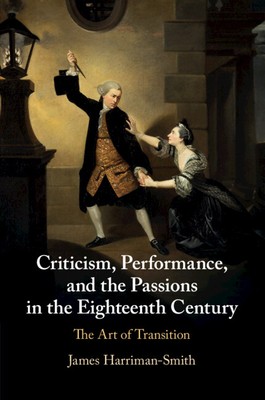
- We will send in 10–14 business days.
- Author: James Harriman-Smith
- Publisher: Cambridge University Press
- ISBN-10: 110881283X
- ISBN-13: 9781108812832
- Format: 15.2 x 22.9 x 1.4 cm, minkšti viršeliai
- Language: English
- SAVE -10% with code: EXTRA
Criticism, Performance, and the Passions in the Eighteenth Century (e-book) (used book) | bookbook.eu
Reviews
Description
Great art is about emotion. In the eighteenth century, and especially for the English stage, critics developed a sensitivity to both the passions of a performance and what they called the transitions between those passions. It was these pivotal transitions, scripted by authors and executed by actors, that could make King Lear beautiful, Hamlet terrifying, Archer hilarious and Zara electrifying. James Harriman-Smith recovers a lost way of appreciating theatre as a set of transitions that produce simultaneously iconic and dynamic spectacles; fascinating moments when anything seems possible. Offering fresh readings and interpretations of Shakespearean and eighteenth-century tragedy, historical acting theory and early character criticism, this volume demonstrates how a concern with transition binds drama to everything, from lyric poetry and Newtonian science, to fine art and sceptical enquiry into the nature of the self.
EXTRA 10 % discount with code: EXTRA
The promotion ends in 21d.09:24:46
The discount code is valid when purchasing from 10 €. Discounts do not stack.
- Author: James Harriman-Smith
- Publisher: Cambridge University Press
- ISBN-10: 110881283X
- ISBN-13: 9781108812832
- Format: 15.2 x 22.9 x 1.4 cm, minkšti viršeliai
- Language: English English
Great art is about emotion. In the eighteenth century, and especially for the English stage, critics developed a sensitivity to both the passions of a performance and what they called the transitions between those passions. It was these pivotal transitions, scripted by authors and executed by actors, that could make King Lear beautiful, Hamlet terrifying, Archer hilarious and Zara electrifying. James Harriman-Smith recovers a lost way of appreciating theatre as a set of transitions that produce simultaneously iconic and dynamic spectacles; fascinating moments when anything seems possible. Offering fresh readings and interpretations of Shakespearean and eighteenth-century tragedy, historical acting theory and early character criticism, this volume demonstrates how a concern with transition binds drama to everything, from lyric poetry and Newtonian science, to fine art and sceptical enquiry into the nature of the self.


Reviews